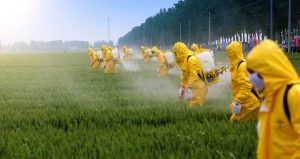A recent study conducted by the Faculty of Exact and Natural Sciences of the University of Buenos Aires (UBA) revealed that glyphosate, the most widely used herbicide worldwide, negatively affects the reproductive system of crabs. This research found that this agrochemical reduces the production and functionality of their sperm, even in low concentrations commonly found in the environment.
Samborombón Bay, in the province of Buenos Aires, is home to thousands of crabs that, in addition to facing natural predators and environmental conditions, must deal with contamination by agrochemicals coming from distant fields. In this context, a team led by Enrique Rodríguez, director of the Crustacean Physiology Laboratory at UBA, conducted a 100-day experiment to assess the impact of glyphosate on these creatures.
For this purpose, the crabs were exposed to different concentrations of glyphosate: some low, similar to those commonly found in the environment, and others higher, typical of significant spills. The results showed harmful effects in both cases. According to Ivana Canosa, the lead author of the study published in Science of the Total Environment, “an increase in the proportion of sperm unable to complete the acrosomal reaction necessary for fertilization was recorded.”
This damage is not limited to crabs alone, as the reduction in egg and larval production affects fish for human consumption, such as sea bass and mullet, which depend on these larvae for food. Likewise, birds that feed on crabs are harmed, thus affecting the entire food chain. Additionally, crabs play a key role as “ecosystem engineers”, as their burrows help in the recirculation of nutrients and soil shaping.

A Wider Issue
The study also adds to a growing concern about the impact of contaminants on aquatic ecosystems. Previous research led by Rodríguez’s team demonstrated that other pollutants, such as microplastics and diclofenac (a common anti-inflammatory), also severely affect crustaceans and other organisms.
In the case of glyphosate, Rodríguez warns that “even concentrations close to those commonly found in the environment, tested over an extended period, caused concerning effects on crabs“.
The findings highlight how the intensive use of agrochemicals can have devastating consequences not only for specific species but also for ecosystems as a whole, including those important for food security and environmental balance.

How does glyphosate affect crabs?
Glyphosate, an herbicide, can affect crabs in several ways, including:
- Reproductive system alteration: Glyphosate can affect sperm functionality, reducing the reproductive potential of crabs.
- Decrease in egg quantity: Glyphosate can lead to a decrease in the quantity of eggs laid by crabs.
- Morphological abnormalities: Crab larvae exposed to glyphosate may exhibit morphological abnormalities.
Glyphosate is the most widely used herbicide in the world. Its use increased with the introduction of genetically modified crops tolerant to the herbicide.
To help conserve crabs, one can purchase crabs from sustainable sources, follow local fishing regulations, and advocate for ocean conservation.
Have you already checked out our YouTube channel? Subscribe now!

